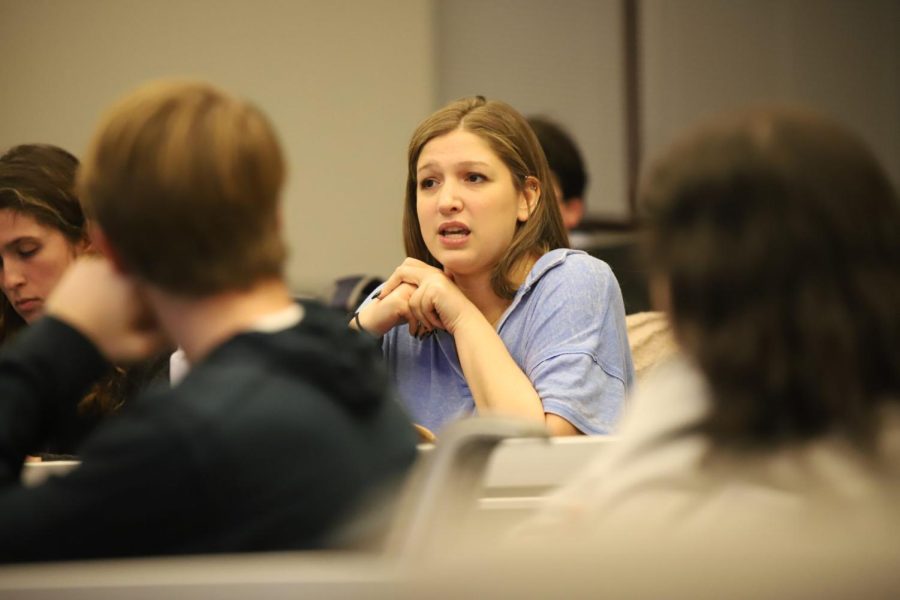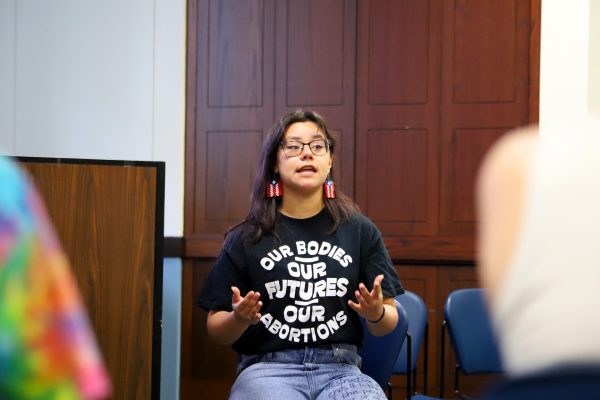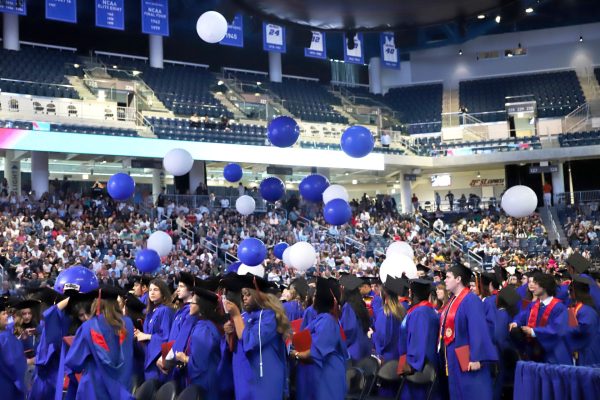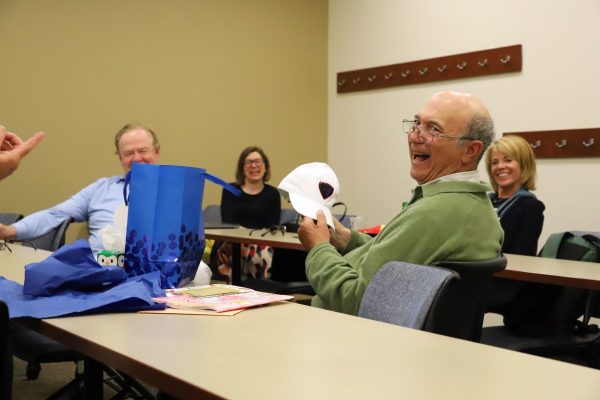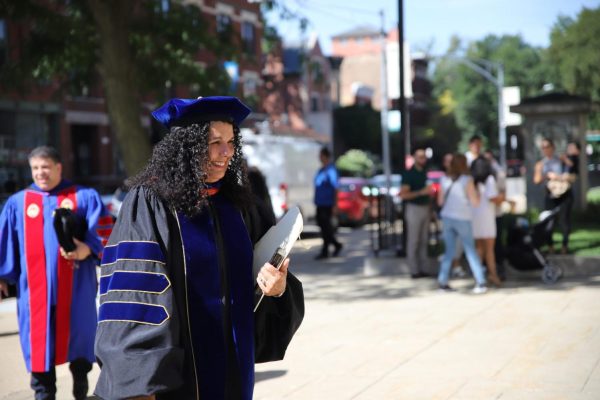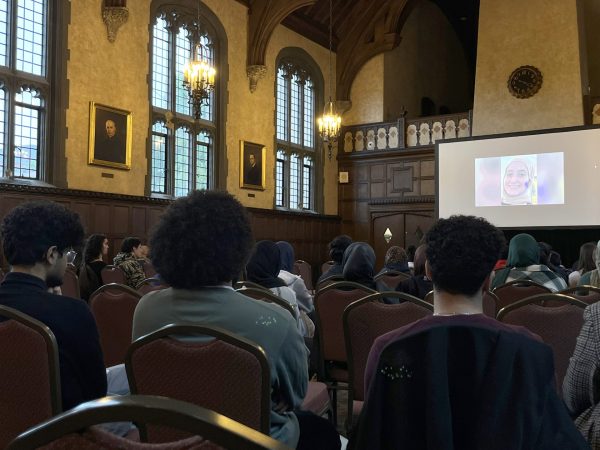Antisemitism panel discusses education, prevention for hate on-campus
Kiersten Riedford for The DePaulia
Emily Lightman speaks at a Student Government Association (SGA) meeting about antisemitism on Nov. 10, 2022.
Student Government Association (SGA) and Alpha Epsilon Pi (AEPi) co-sponsored an Antisemitism Panel Discussion on April 19, bringing together students and administration to address anti-Jewish hate speech and violence on-campus.
Guest speakers Trent Spoolstra, the associate regional director for the Midwest office of the Anti-Defamation League (ADL), and Alison Pure-Slovin, the Midwest director of the Simon Wiesenthal Center, gave presentations about past and present antisemitism in the country. Shortly after, a panel of guest speakers and Jewish student leaders answered questions from attendees regarding topics ranging from Jewish identity to why antisemitism is increasing.
“It was about making sure people knew there is a Jewish presence on this campus,” said Justin Fisher, vice president of Jewish student club Chabad and senior. “In the past, people have been scared to show their Jewish identity here but with the actions we’re taking to help, it is really making students feel more accepted.”
The discussion was part of a continued effort between SGA and Jewish student organizations that began last fall, when they collaborated to draft a statement condemning antisemitism at the university.
“I remember the statement was put out after helping student government edit that document for hours,” said Emily Fridland, president of Chabad and senior. “Even if more than half of all students didn’t open that email, the headline of it and putting out that statement made me feel infinitely more like I belonged here.”
Both organizations were planning separate antisemitism discussion events until Fisher reached out to Adora Alava, SGA Executive Vice President for Diversity and Equity and junior, about merging them together.
For SGA, planning the event was a months-long process that Alava said helped strengthen the bond between SGA and Jewish student life organizations on-campus.There are 675 Jewish students at DePaul according to a Hillel International study from an unknown year.
“One of the main things that concerned me about what I heard from Jewish life was that they didn’t feel like they could reach out to other organizations on-campus,” Alava said. “Even outside of SGA, no one should feel this way. No one should ever feel isolated. I wanted to make sure everyone in that community felt supported.”
Fridland came up with the event two years ago while talking to the rabbi of Chabad about student experiences with antisemitism. She said it began as a longer project of compiling those students’ stories of anti-Jewish hate at DePaul as an initiative to bring them to the administration’s attention.
“I have found my community here, and it’s made me realize how much of a passion I have for this fight,” Fridland said. “I’m with these people and we’re going to be supporting each other so that when there are times of antisemitism, we don’t feel like the only Jew in the room. It makes me feel very seen and heard.”
Spoolstra said in his presentation that antisemitism in the country has been increasing rapidly over the past five years and can be attributed to worsening social and political issues. A 2021 study from the Federal Bureau of Investigation found that 51.4% of the 1590 religion-based hate crimes were anti-Jewish. Spoolstra said people are looking for someone to blame and minority groups have become that outlet. Additionally, people are facing increased stressors from post-pandemic fallout like inflation and even more prevalence of racial injustices.
“A lot of Americans right now are experiencing anger, fear and anxiety,” Spoolstra said. “There’s something in us as human beings that when we feel these, we look for scapegoats as a reason for why this is happening. That is why organizations like the ADL are here to fight this. We’re not just going to accept it and wait for times to get better but rather we’re going to be proactive.”
Spoolstra said education is the biggest tool to prevent antisemitism by breaking down ignorance and finding commonality. He encouraged students to educate themselves not only by looking online for information about antisemitism but also by attending events held by Jewish student organizations like Chabad, Hillel and AEPi.
“There’s still a lot of ignorance in the world,” Spoolstra said. “We think that we know things based only on assumptions even though most of us have a smartphone with a ton of information at their fingertips. DePaul is also very lucky to have Jewish organizations so you have those resources right in front of you. Reach out to each other and learn.”
Fisher and Fridland said cooperating with SGA is one way the university has stepped up to help the Jewish community. They both have experienced less antisemitism on-campus because of the administration’s work to recognize anti-Jewish rhetoric at DePaul and their efforts to prevent it.
“We’re seeing a lot more people wanting to meet with us and the Jewish groups on-campus,” Fridland said. “Administrators and student government have really taken on the initiative to acknowledge that they haven’t always done the greatest job in dealing with antisemitism in the past.”
SGA and the Jewish student organizations hope to collaborate again as they continue addressing antisemitism at the university. Fridland said after working with administration and SGA, she wants to focus her efforts on peer-to-peer conversations to make sure all levels of the community are involved in stopping antisemitism. Fisher said educating people about antisemitism will continue using DePaul’s resources.
“I know the ups and downs when I hear these stories of antisemitism because it breaks my heart but I can do something to help,” Fisher said. “We are trying to be that push to improve our community and fight for what we care about. There will always be a drive to make sure this campus is as safe as possible for everyone.”


